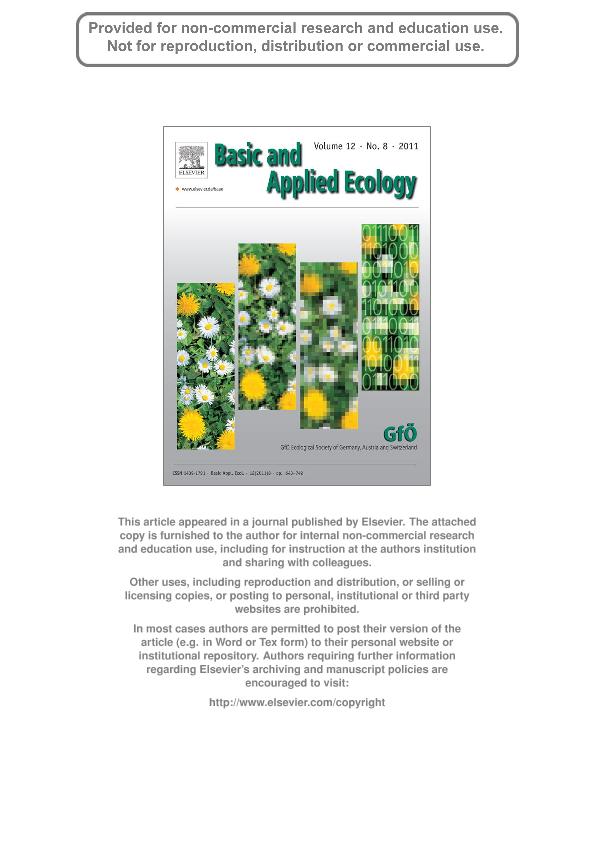Artículo
Coarse woody debris (CWD) plays a key role in ecosystems, reducing erosion and affecting soil development, storing nutrients and water, providing a major source of energy and nutrients, serving as a seedbed for plants and as habitat for decomposers and heterotrophs. We asked whether removal of CWD affected the structure and functioning of an arid woodland ecosystem in mid-western Argentina. These woodlands are protected by national laws and inhabited by indigenous local pastoralists who have land rights to use natural resources, including wood for fuel and construction material. We hypothesized that removal of CWD affected negatively the populations of wood-nesting pollinators, the reproductive performance of Prosopis flexuosa (the dominant tree species), plant cover, richness and composition, and nutrient cycling in the soil. We conducted a manipulative experiment consisting of four pairs of 70. m radius circular plots, each pair with an experimental (CWD removal) and a control (no removal) plots. Experimental CWD extraction affected negatively flower visitor abundance, although the magnitude of this effect decreased over time. In contrast, extraction had a significant, positive effect on seed production of P. flexuosa. No significant effects of extraction were found on cover, richness and composition of understory plants and soil properties. Thus, CWD did not have the generally negative effects expected under our hypotheses. © 2011 CONICET/Universidad Nacional de Cuyo. Grobe Holzstreu (CWD) spielt in Ökosystemen eine Schlüsselrolle, da sie die Erosion vermindert und die Bodenentwicklung beeinflusst. Indem sie Nährstoffe und Wasser speichert stellt sie eine bedeutende Quelle für Energie und Nährstoffe dar und dient als Samenbeet für Pflanzen und als Habitat für Zersetzer und Heterotrophe. Wir fragten, ob die Entfernung der CWD die Struktur und Funktion eines trockenen Waldökosystems im mittleren Westen Argentiniens beeinflusst. Diese Wälder sind durch nationale Gesetze geschützt und von indigenen lokalen Siedlern bewohnt, die die Landrechte besitzen natürliche Ressourcen zu nutzen, die Brennholz und Baumaterial beinhalten. Wir stellten die Hypothese auf, dass die Entfernung der CWD die Populationen von holznistenden Bestäubern, den reproduktiven Erfolg von Prosopis flexuosa (einer dominanten Baumart), die Pflanzendeckung, den Artenreichtum und die Zusammensetzung sowie den Nährstoffkreislauf im Boden negativ beeinflusst. Wir führten manipulative Experimente durch, die aus vier Paaren von kreisrunden Flächen mit einem Radius von 70m bestanden. Jedes Paar bestand aus einer experimentellen Fläche (CWD-Entfernung) und einer Kontrollfläche (keine Entfernung). Die experimentelle CWD-Entfernung beeinflusste die Abundanz der Blütenbesucher negativ, obwohl die Größenordnung dieses Effektes mit der Zeit abnahm. Im Gegensatz dazu hatte die Entfernung einen signifikanten positiven Effekt auf die Samenproduktion von P. flexuosa. Es gab keine signifikanten Effekte der Entfernung auf die Pflanzendeckung, den Artenreichtum und die Zusammensetzung der Pflanzen im Unterholz und auf die Bodeneigenschaften. Daher hatte die CWD nicht die allgemeinen negativen Effekte, die wir hypothetisch erwartet hatten.
Ecological consequences of dead wood extraction in an arid ecosystem
Vazquez, Diego P. ; Alvarez, Juan Agustin
; Alvarez, Juan Agustin ; Debandi, Guillermo; Aranibar, Julieta Nelida
; Debandi, Guillermo; Aranibar, Julieta Nelida ; Villagra, Pablo Eugenio
; Villagra, Pablo Eugenio
 ; Alvarez, Juan Agustin
; Alvarez, Juan Agustin ; Debandi, Guillermo; Aranibar, Julieta Nelida
; Debandi, Guillermo; Aranibar, Julieta Nelida ; Villagra, Pablo Eugenio
; Villagra, Pablo Eugenio
Fecha de publicación:
12/2011
Editorial:
Elsevier Gmbh, Urban & Fischer Verlag
Revista:
Basic and Applied Ecology
ISSN:
1439-1791
Idioma:
Inglés
Tipo de recurso:
Artículo publicado
Clasificación temática:
Resumen
Archivos asociados
Licencia
Identificadores
Colecciones
Articulos(IADIZA)
Articulos de INST. ARG DE INVEST. DE LAS ZONAS ARIDAS
Articulos de INST. ARG DE INVEST. DE LAS ZONAS ARIDAS
Articulos(IANIGLA)
Articulos de INST. ARG. DE NIVOLOGIA, GLACIOLOGIA Y CS. AMBIENT
Articulos de INST. ARG. DE NIVOLOGIA, GLACIOLOGIA Y CS. AMBIENT
Citación
Vazquez, Diego P.; Alvarez, Juan Agustin; Debandi, Guillermo; Aranibar, Julieta Nelida; Villagra, Pablo Eugenio; Ecological consequences of dead wood extraction in an arid ecosystem; Elsevier Gmbh, Urban & Fischer Verlag; Basic and Applied Ecology; 12; 8; 12-2011; 722-732
Compartir
Altmétricas



